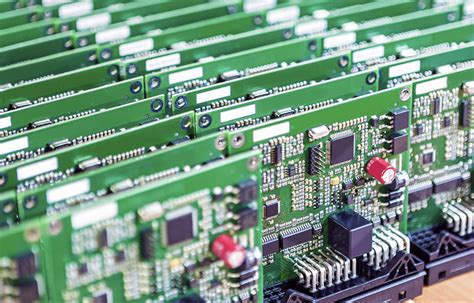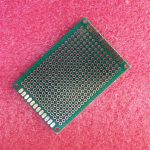Understanding Your PCB Requirements
Before embarking on the search for a PCB Manufacturer, it is essential to have a clear understanding of your PCB requirements. This involves considering various aspects of your project, such as:
PCB Complexity and Layer Count
The complexity of your PCB design and the number of layers required will significantly impact your choice of manufacturer. Some manufacturers specialize in simple, single-layer boards, while others have the expertise and capabilities to handle complex, multi-layer designs. Determine the complexity of your PCB and ensure that the manufacturer you choose has the necessary experience and technology to meet your requirements.
Material Selection
PCBs can be manufactured using different materials, each with its own properties and advantages. Common materials include FR-4, high-frequency laminates, and flexible substrates. Consider the specific requirements of your application, such as temperature tolerance, dielectric constant, and signal integrity, to select the appropriate material. Ensure that the manufacturer you choose has experience working with the material you require and can provide the necessary guidance and recommendations.
PCB Size and Thickness
The size and thickness of your PCB will also influence your choice of manufacturer. Some manufacturers specialize in producing small, high-density boards, while others excel in larger, thicker PCBs. Consider the dimensions and thickness requirements of your design and verify that the manufacturer has the capability to produce boards that meet your specifications accurately.
Surface Finish and Soldermask
The surface finish and soldermask of your PCB play a crucial role in its functionality and reliability. Different surface finishes, such as HASL (Hot Air Solder Leveling), ENIG (Electroless Nickel Immersion Gold), and OSP (Organic Solderability Preservative), offer varying levels of protection, solderability, and cost. Similarly, the choice of soldermask color and type can impact the aesthetics and performance of your PCB. Discuss your surface finish and soldermask requirements with potential manufacturers to ensure they can meet your specific needs.
Manufacturer Capabilities and Experience
When evaluating PCB manufacturers, it is crucial to assess their capabilities and experience to determine if they are a good fit for your project. Consider the following factors:
Manufacturing Capabilities
Investigate the manufacturer’s production capabilities, including their equipment, technology, and capacity. Ensure that they have the necessary machinery and expertise to handle your PCB manufacturing requirements efficiently. Inquire about their manufacturing processes, such as etching, drilling, plating, and assembly, to gauge their level of sophistication and adherence to industry standards.
Quality Control and Testing
A reliable PCB manufacturer should have robust quality control and testing procedures in place to ensure the consistency and reliability of their products. Ask about their quality assurance processes, such as automated optical inspection (AOI), X-ray inspection, and electrical testing. Inquire about their certifications, such as ISO 9001 and IPC standards, which demonstrate their commitment to quality and adherence to industry best practices.
Experience and Expertise
Consider the manufacturer’s experience and expertise in the PCB industry. Look for a manufacturer with a proven track record of successfully delivering projects similar to yours. Inquire about their experience working with specific industries, such as automotive, medical, or aerospace, if applicable to your project. A manufacturer with relevant experience and expertise can provide valuable insights and recommendations to optimize your PCB design and manufacturing process.
Technical Support and Communication
Effective communication and technical support are essential for a smooth and successful PCB manufacturing partnership. Evaluate the manufacturer’s responsiveness and willingness to engage in open and transparent communication. Inquire about their technical support services, such as design review, DFM (Design for Manufacturability) analysis, and troubleshooting assistance. A manufacturer that offers prompt and knowledgeable technical support can help you navigate any challenges that may arise during the manufacturing process.
Lead Time and Delivery
The lead time and delivery capabilities of a PCB manufacturer are critical factors to consider, especially if you have strict deadlines or time-to-market requirements. Consider the following aspects:
Production Lead Time
Inquire about the manufacturer’s typical production lead times for projects similar to yours. Consider factors such as PCB complexity, quantity, and any additional services required, such as assembly or testing. Ensure that the manufacturer can meet your desired lead times without compromising on quality.
Expedited Services
In some cases, you may require expedited PCB manufacturing services to meet urgent deadlines. Discuss the availability and cost of expedited services with potential manufacturers. Evaluate their ability to prioritize your project and deliver high-quality PCBs within a compressed timeline.
Shipping and Logistics
Consider the manufacturer’s shipping and logistics capabilities, especially if you require international delivery. Inquire about their shipping methods, carriers, and estimated transit times. Evaluate their ability to handle customs clearance and documentation, if applicable. A manufacturer with reliable shipping and logistics processes can ensure that your PCBs are delivered on time and in good condition.

Cost and Pricing
Cost is undoubtedly an important consideration when choosing a PCB manufacturer. However, it is crucial to strike a balance between cost and quality to ensure the long-term success of your project. Consider the following factors:
Competitive Pricing
Compare the pricing of different PCB manufacturers to ensure that you are getting a competitive rate for your project. Keep in mind that the lowest price may not always equate to the best value. Consider the overall package, including quality, reliability, and additional services offered, when evaluating pricing.
Volume Discounts
If you have a high-volume PCB manufacturing requirement, inquire about volume discounts offered by manufacturers. Many manufacturers provide tiered pricing based on order quantity, which can result in significant cost savings for larger projects.
Hidden Costs and Fees
Be aware of any hidden costs or fees that may not be immediately apparent in the manufacturer’s pricing structure. Inquire about additional charges for services such as design review, tooling, or expedited production. Ensure that you have a clear understanding of the total cost of your project to avoid any surprise expenses down the line.
Customer Support and Relationship
Building a strong and collaborative relationship with your PCB manufacturer is essential for the success of your project. Consider the following aspects of customer support and relationship:
Responsiveness and Communication
Evaluate the manufacturer’s responsiveness and communication channels. Ensure that they have dedicated customer support representatives who are easily accessible and willing to address your queries and concerns promptly. Clear and efficient communication is crucial for maintaining a smooth and productive partnership.
Flexibility and Adaptability
Consider the manufacturer’s flexibility and adaptability to accommodate changes or modifications to your project. Discuss their willingness to work with you on design revisions, prototype iterations, or any other adjustments that may arise during the manufacturing process. A flexible and adaptable manufacturer can help you navigate unforeseen challenges and ensure the successful completion of your project.
Long-Term Partnership
Evaluate the potential for a long-term partnership with the PCB manufacturer. Consider their ability to scale production as your business grows and their willingness to invest in your success. A manufacturer that values long-term relationships and is committed to your growth can provide a stable and reliable supply chain for your future projects.
Reputation and References
Before making a final decision, it is essential to research the reputation and gather references for potential PCB manufacturers. Consider the following:
Industry Reputation
Investigate the manufacturer’s reputation within the PCB industry. Look for reviews, testimonials, and case studies from their existing clients. Attend industry events or forums to gather insights and opinions from other professionals in the field. A manufacturer with a strong industry reputation is more likely to deliver high-quality products and reliable services.
Client References
Request client references from the manufacturer and reach out to them to gather firsthand feedback. Inquire about their experience working with the manufacturer, including the quality of products, adherence to timelines, communication, and overall satisfaction. Client references can provide valuable insights into the manufacturer’s capabilities and help you make an informed decision.
Frequently Asked Questions (FAQ)
-
Q: How do I determine the appropriate layer count for my PCB?
A: The layer count of your PCB depends on the complexity of your design, signal integrity requirements, and the number of components involved. Consult with your PCB manufacturer’s technical support team to discuss your specific requirements and receive guidance on the optimal layer count for your project. -
Q: What is the difference between HASL and ENIG surface finishes?
A: HASL (Hot Air Solder Leveling) is a cost-effective surface finish that provides good solderability and is suitable for general-purpose applications. ENIG (Electroless Nickel Immersion Gold) offers superior flatness, corrosion resistance, and is ideal for high-reliability and fine-pitch applications. The choice between HASL and ENIG depends on your specific requirements and budget. -
Q: How can I ensure the quality and reliability of my PCBs?
A: To ensure the quality and reliability of your PCBs, choose a manufacturer with robust quality control processes, such as automated optical inspection (AOI), X-ray inspection, and electrical testing. Look for certifications like ISO 9001 and IPC standards, which demonstrate the manufacturer’s commitment to quality. Additionally, request product samples and conduct thorough testing to verify the performance and reliability of the PCBs. -
Q: What should I consider when comparing pricing from different PCB manufacturers?
A: When comparing pricing, consider the total cost of ownership, including the base price, any additional services required (e.g., assembly, testing), and shipping costs. Keep in mind that the lowest price may not always equate to the best value. Evaluate the manufacturer’s quality, reliability, and customer support alongside the pricing to make an informed decision. -
Q: How can I ensure smooth communication with my PCB manufacturer, especially if they are located overseas?
A: To ensure smooth communication with your PCB manufacturer, establish clear communication channels and protocols from the outset. Utilize email, video conferencing, and project management tools to maintain regular contact. Ensure that the manufacturer has dedicated customer support representatives who are responsive and proficient in your preferred language. Consider time zone differences and plan communication accordingly to avoid delays.
Conclusion
Choosing the right PCB manufacturer is a critical decision that can significantly impact the success of your electronic products. By considering factors such as PCB complexity, material selection, manufacturer capabilities, lead time, cost, customer support, and reputation, you can make an informed choice and establish a reliable partnership.
Remember to thoroughly evaluate potential manufacturers, request quotes and samples, and engage in open communication to ensure that your requirements are clearly understood. Building a strong relationship with your PCB manufacturer based on trust, transparency, and collaboration can lead to long-term success and growth for your business.
By following the guidelines outlined in this article and conducting thorough research, you can confidently select a PCB manufacturer that aligns with your needs and helps bring your electronic designs to life with the highest quality and reliability.
| Factor | Considerations |
|---|---|
| PCB Complexity | Layer count, design intricacy, manufacturing capabilities |
| Material Selection | FR-4, high-frequency laminates, flexible substrates |
| Manufacturer Capabilities | Equipment, technology, quality control, certifications |
| Lead Time and Delivery | Production lead time, expedited services, shipping logistics |
| Cost and Pricing | Competitive pricing, volume discounts, hidden costs |
| Customer Support | Responsiveness, communication, flexibility, long-term partnership |
| Reputation and References | Industry reputation, client references, testimonials |
By carefully evaluating these factors and making an informed decision, you can choose the right PCB manufacturer that meets your specific requirements and sets the foundation for a successful and long-lasting partnership in the world of electronic product development.






Leave a Reply